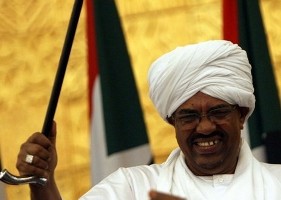Sudan’s Taha rejects ICC accusations against President Bashir
July 14, 2008 (KHARTOUM) – Sudan’s Second Vice President Ali Osman Taha on Monday rejected International Criminal Court (ICC) prosecutor’s accusations against President Omer al- Bashir, dismissing them as “null and false.”

Speaking at a press conference held Monday in response to the ICC prosecutor’s demand to issue an arrest warrant against President al-Bashir for genocide, crimes against humanity and war crimes in Darfur, Taha stressed that the court has no jurisdiction in his country, and Sudan never recognizes the court.
The ICC move is a politically-motivated one against Sudan instead of a legal one, he pointed out.
Moreno-Ocampo said most members of three targeted ethnic groups – Fur, Masalit and Zaghawa –were driven from their homes by Sudanese forces and the janjaweed in 2004. Since then, the janjaweed have been targeting the camps aiming to starve the refugees.
The prosecutor filed 10 charges: three counts of genocide, five of crimes against humanity and two of murder. Judges are expected to take months to study the evidence before deciding whether to order al-Bashir’s arrest.
Al-Bashir “wants to end the history of the Fur, people. I don’t have the luxury to look away. I have evidence,” the prosecutor said in a statement after submitting his case to the judges.
However the vice-president said the conflicts between different tribal groups in Darfur are originated from disputes over land and water, which have begun before President Bashir rose to power, and are by no means ethnically based, he said.
Taha, has dismissed that particular ethnic groups in Darfur had been targeted for annihilation by the Sudanese government, the staouhte electronic media reported today.
“It is absolutely not true that all of these rebel movements fighting the government belong to the same [ethnic] group.”
“The tribes purported to be victims of genocide have among their members large groups who are loyal to the government and take part in its institutions, armed forces, security services and high-ranking political and administrative positions.”
Taha wondered how anyone “could say that these groups, participating in the state structure, are being targeted on ethnic grounds, in order to be obliterated or eradicated”.
He admitted that “it is true that there are factions of these tribes, be they Masalit, Zaghawa or Fur, as well as Arab tribes, who rebel against the government and take up arms” and that, however, “it is not true that entire ethnic groups are opposing the government, nor that the government is exterminating or annihilating them”.
Asked about the position of the Sudan People’s Liberation Movement, his partner in the national unity government, Taha said the SPLM stands firm by the Sudanese president.
“The position of the SPLM is the position of patriotism and responsible attitude. It is based on the full solidarity with the President.”
He further said southern Sudanese will be the first to pay the price of the indictment of al-Bashir if the judges follow the conclusions of the prosecutor and issue the arrest warrant.
“Southern Sudan are the first to be harmed by the disruption of the peace implementation if the procedure is engaged to its end;” Taha said.
“Therefore, I confirm that this position is representing the whole SPLM and it was expressed yesterday in the Council of Ministers by interventions were broadcast on the air in which spoke more than a minister of the SPLM. The coming days will confirm this and we do not have any doubt in the patriotic attitude of the SPLM.”
ICC Prosecutor Luis Moreno-Ocampo said on Monday 2.5 million Darfuris were subject to a campaign of “rape, hunger and fear” in refugee camps, where he said genocide continued “under our eyes”.
International experts estimate that at least 200,000 people have died since war erupted in 2003. Khartoum puts the figure at around 10,000.
(ST)
